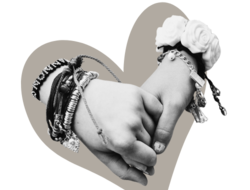Every ongoing interaction is a relationship, and we talk about all kinds of them: friendships, romantic and sexual relationships, relationships at work and at home, at school and out and about in the world. Dating, breakups, shakeups, makeups; situationships, crushes, love-of-your-lifes. From figuring out what kinds of relationships you want, to navigating change or trouble, if it’s about you + someone else, it’s probably here.
Relationships

Highlighted content
There’s a guy that I like and I know he likes me back I’m just not sure how to tell him that I like him. I’ve never been asked or asked someone out before so I’m not even sure what to do. Nothing is...
How do I ask a guy out?
- Mo Ranyart
- Lisa Laman
I did not feel ready to navigate possible transphobia alone, I needed backup. I was expecting to have that for this date via the person I was on the date with. Without her, I felt trapped in a restaurant where I felt other patrons looking at me or whispering about me. This was a steakhouse in the heart of Plano, Texas.
- Lisa Laman
Many social norms, macro or micro, can make it seem like the ideal — or even only! — time to start having dating experiences is in high school. You may get the message that doing it any other time, even just waiting until you’re in college, puts you at some kind of disadvantage. To go against that grain may inspire some social judgement of you and, at least in my case, leave you wondering if you’re just fulfilling a harmful stereotype about what autistic people are capable and incapable of doing. Even if it’s impossible to remember amidst the din of outside messaging world, there is no one right time for dating. That’s as true for neurodivergent folks, including those of us on the autism spectrum, as it is for neurotypical members of the world.
- Mo Ranyart
This is a great question. I can really sympathize with how all of these elements can make socializing more difficult and how frustrating that can be, especially at a time when you may feel like you want extra support from the people in your life. I don't think there's one clear solution here, but I...
- Lisa Laman
If you’re like me, there are lots of questions that race through your mind when you prepare to go out on a date. Do I look polished enough? Am I going to click with this person? Did we pick the right venue to go out to? And then there’s the one question always gnawing at the back of my skull about my autism: can I be myself?
- Celia Bliss
This is a situation with many layers, so I’m not surprised you feel such a mixture of emotions, especially feelings of detachment. First, I want to encourage you to give yourself space to recognize how challenging this situation is and how there is no template for what you’re feeling. This will...
- Mo Ranyart
Just like with any kind of relationship, there's no way that a FWB setup looks for everyone who chooses one. The short answer is that being friends with benefits is whatever the people involved agree that it should be, so you'll have to ask your potential partner some questions and share your own...
- Melissa Meszaros
The author of the new book Heavy Metal Headbang shares some of how dating went for her while recovering from a traumatic brain injury (TBI) and has a little advice for those with TBI who are dating, and those dating anyone with a TBI.
- Linnea Hjelm
It’s likely that you will or already do know someone who will experience or has experienced trauma of some form. As friends, it’s important that we understand the responsibilities and limitations of our role, so we can best support our friends who are survivors and maintain our boundaries. Has someone disclosed to you a traumatic experience they’ve had? How can you best support that person and yourself? Here’s some information about trauma, the role of friends, and what it means to really support survivors.
- Abigail Moss
Dynamics like mine require a lot of honesty, and often speaking honestly can make you feel vulnerable, but showing vulnerability to a partner is a good way to build trust and intimacy. At the same time, you learn a lot about yourself as you're forced to ask yourself tough questions and to think carefully about what you want from a relationship and why - in turn, this makes you appreciate the reasons you want to be with your partner(s), and what it is about being with them that makes you happy.
- Haley Moss
Disability may feel scary if you’re new to it - there is a lot of language involved to learn, maybe more medical information than you feel capable of handling, or you might have a fear about possibly being cast in a caregiver role more so than a partner. All of these fears can be dispelled or addressed through ongoing, healthy communication. In my experience, disclosure is an ongoing conversation and there is no single “correct” way to do it, but there are ways that our partners can be stronger allies.


